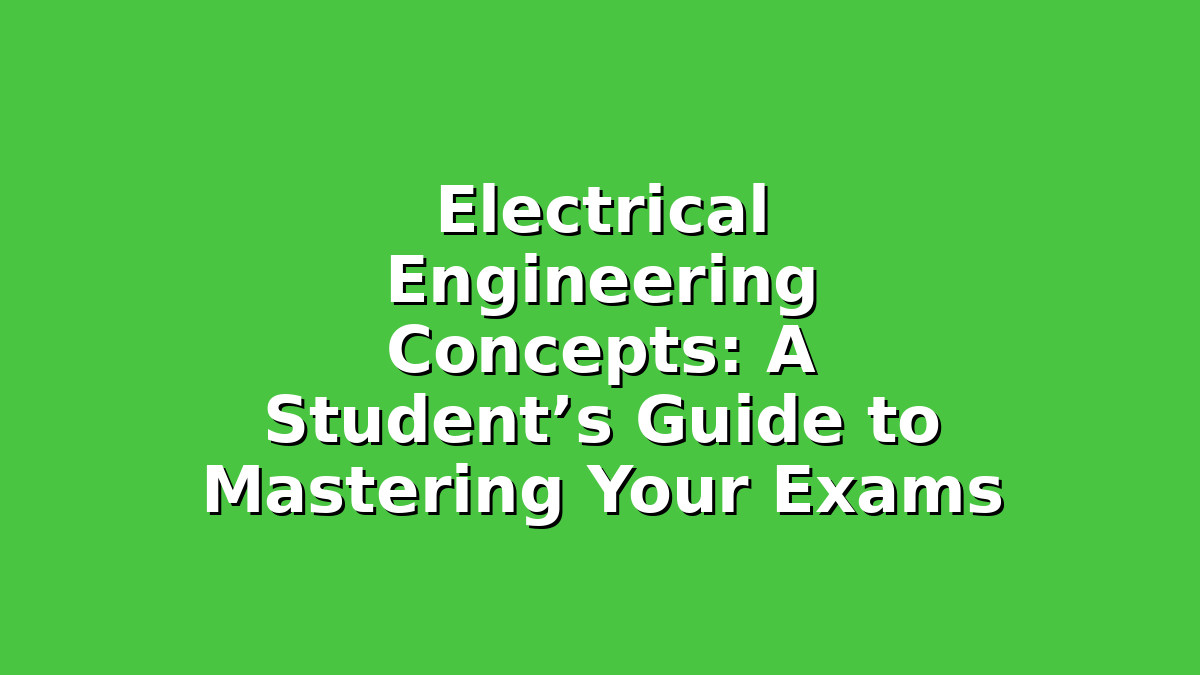Electrical engineering is a fascinating and dynamic field that forms the backbone of modern technology. From the smartphones in our hands to the power grids lighting up entire cities, electrical engineering concepts are at play everywhere. If you’re a student preparing for exams or looking to strengthen your understanding of electrical engineering, this guide is here to help. We’ll break down key concepts and provide effective study tips tailored to your needs, so you can approach your exams with confidence and clarity.
Understanding the Core Concepts of Electrical Engineering
Before diving into detailed topics, it’s essential to have a strong grasp of fundamental electrical engineering principles. These concepts form the foundation for more advanced topics and problem-solving strategies.
– Ohm’s Law: This is the cornerstone of electrical engineering, which states the relationship between voltage (V), current (I), and resistance (R): V = IR. Knowing how to apply this law helps you analyze simple circuits and understand how electrical components interact.
– Circuit Analysis: Learning how to analyze series and parallel circuits is critical. Practice calculating equivalent resistance, voltage drops, and currents through different components, which builds your problem-solving skills.
– Kirchhoff’s Laws: Kirchhoff’s Current Law (KCL) and Kirchhoff’s Voltage Law (KVL) extend your ability to analyze complex circuits that can’t be simplified easily. They allow you to write equations based on current flow and voltage around loops, an essential skill in exam questions.
Section 1: Mastering Electrical Circuit Theory with Effective Study Techniques
Circuit theory is a major part of electrical engineering exams. To master it, focus on both conceptual understanding and practical application.
Study Tip 1: Visual Learning with Circuit Diagrams
Drawing circuit diagrams helps you visualize current paths and component connections. Try redrawing problems from your textbook or lecture slides instead of just reading them. Use colors to differentiate between components or currents, which can make complex circuits easier to understand.
Study Tip 2: Solve a Variety of Problems
Practice is key. Work on as many circuit problems as you can find, starting from simple circuits and gradually moving to more complex ones. Use textbooks, online resources, and past exam papers. When you encounter a problem you don’t understand, break it down by applying Ohm’s Law, KCL, and KVL step-by-step. This systematic approach will help reinforce your learning and reduce exam anxiety.
Study Tip 3: Group Study and Discussion
Explaining circuit problems to peers or tackling tough questions together can deepen your understanding. Group discussions often expose you to different solving methods and clarify doubts, making learning more interactive and less stressful.
Section 2: Demystifying Electromagnetism with Conceptual Focus
Electromagnetism is another vital topic that can feel abstract but is essential for understanding how electrical devices work.
Study Tip 1: Relate Theory to Real-World Applications
Connecting electromagnetic concepts to everyday technology (like transformers, motors, and wireless charging) makes the material more relatable. When studying topics like magnetic fields, Faraday’s Law, or inductance, research how these principles are used in practical devices.
Study Tip 2: Use Visual Aids and Simulations
Electromagnetic fields are invisible, which makes them tricky to grasp purely through text. Use online simulations and animation tools to see magnetic field lines, flux changes, and induced currents in action. Tools like PhET Interactive Simulations or MATLAB can help you visualize and experiment with these concepts virtually.
Study Tip 3: Create Summary Sheets with Formulas and Definitions
Electromagnetism involves many formulas and important physical laws. Make concise summary sheets or flashcards for quick revision of key equations, units, and definitions. This makes last-minute cramming more manageable and helps commit critical information to memory.
Section 3: Power Systems and Electronics – Combining Theory and Practice
Power systems and electronics encompass the generation, transmission, and control of electrical power, as well as the behavior of semiconductors and electronic circuits.
Study Tip 1: Understand the Big Picture
Start by understanding how power systems operate on a large scale: from power plants to distribution networks and end-users. Visual aids like flowcharts or block diagrams can clarify how energy moves through a system and what role each component plays.
Study Tip 2: Practice Circuit Simulation Software
For electronics, practical experience can enhance your theoretical knowledge. Use simulation tools like LTspice or Multisim to design and test electronic circuits virtually. This hands-on approach helps you see the effect of changing component values and understand transistor operation, diode behavior, and amplifier design.
Study Tip 3: Relate Theory to Practical Lab Work
If you have access to a lab, try to connect your theoretical studies with experiments. Building simple circuits or testing components reinforces concepts and helps you remember them better. During exams, you can often draw on this practical understanding to solve problems more intuitively.
Conclusion: Building Confidence and Success in Electrical Engineering Exams
Electrical engineering can seem overwhelming due to its breadth and depth, but with structured study habits and a clear focus on core concepts, you can master it. Start by building a solid foundation in circuit theory, then deepen your understanding of electromagnetism and power systems. Use visual aids, practice extensively, collaborate with peers, and connect theory with real-world applications to enhance your learning.
Remember, consistency is key. Set aside regular study sessions, focus on understanding rather than rote memorization, and tackle problems actively. Mistakes are part of the learning process—use them as stepping stones to improve. With dedication and the right approach, your exam preparation can be both productive and rewarding.
Keep pushing forward, and soon electrical engineering won’t just be a subject you pass—it will be a field you genuinely understand and enjoy!

Responses